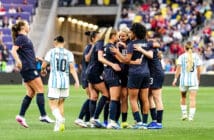“We’re Oxford aren’t we?!”
This was the charming yet slightly unconvincing half-time response offered by injured Oxford United defender Sam Long as he received his Supporters’ Player of the Season award and was asked if it would be possible for his team-mates to mount a second-half comeback from two goals down against Blackpool in the first leg of their League One play-off semi-final.
Although clearly intended as a rallying cry to the 3,224 Yellows fans in attendance, it instead acted as further confirmation that everyone connected with the club is united in their understanding as to why Karl Robinson’s side find themselves 3-0 down heading into the second leg; they’re Oxford aren’t they?
They are a team that appear inextricably connected to the emotional context of the situation around them. A team that took defeat in last season’s play-off final so badly that they found themselves in the relegation zone as Winter set in. A team that seemed destined to miss out on the top six this time around due to the inconsistency that dogged the early Spring when expectation had returned.
They are a side that look just as likely to play to their strengths and tear opponents to shreds with their pace and quality in attack as they are to lose by succumbing to the same issues that seemingly taint the majority of their defeats.
And on Tuesday evening, with fans in the stands for the first time since December, an opportunity to return to Wembley and lay to rest the demons of last July that was earned through a scintillating end to the season was surrendered in the face of an opponent both stubborn and calculated in equal measure.
Although head coach Robinson has the personality and single-mindedness to harness this emotion regularly, he himself can come across as overwhelmed by his feelings to the extent that it damages performances. The fact that he was serving a touchline ban for Oxford’s biggest game of the season as a result of a sending off at Sunderland in April a case in point.
The former MK Dons and Charlton Athletic boss showcased his excitable nature before the game had even begun, first spending the best part of half an hour speaking at, rather than to, opposite number Neil Critchley after both had conducted their pre-game media duties, before taking to the field to reacquaint himself with the Oxford supporters with a barrage of waves and claps.
Even following the game, as Robinson claimed he felt calm after watching 90 minutes that had been decided by fine margins, he felt compelled to say the fans had deserved a better result and was assertive when suggesting that Blackpool’s James Husband had avoided a ‘blatant’ red card in the early stages before defiantly rejecting the idea that the tie is over.
But it was Robinson’s capacity to galvanise the talented group of players at his disposal that got Oxford into this position. His decision to throw caution to the wind in the final weeks of the regular season and select as many attacking players as possible in his favoured 4-3-3 formation brought about a run of five wins in six to secure sixth place on the final day and set up the opportunity for redemption.
He stood by this system against Blackpool. Mark Sykes and James Henry were fielded ahead of Cameron Brannagan in midfield rather than a re-introduction for the more defensive-minded, yet out-of-form, Alex Gorrin. Brandon Barker returned from injury on the left wing but neither he nor Elliot Lee on the right were ever likely to provide much support for the full-backs behind them.
The opening ten minutes of the game made it look as though Robinson’s commitment to attack might just pay off. Barker caused havoc on three separate occasions, providing one particularly presentable opportunity for Henry that was blocked by team-mate Matty Taylor in an offside position, and the incident that saw Husband bring down Sykes suggested Blackpool’s imperious backline was creaking.
The last meeting between the sides finished 2-0 to Blackpool at the Kassam Stadium in March, with the visitors scoring two first-half goals from set-pieces, and Robinson stressed before Tuesday night’s game that his side would have to be better when defending similar situations to come out on top.
It therefore must have been a considerable frustration for him when Josh Ruffels dangled a leg at a deep free-kick from Blackpool’s Elliot Embleton, deflecting the ball into the path of a gaggle of white shirts and allowing Ollie Turton to tap home at the back post.
It was the type of error that can happen against a side that have an impressive record at scoring from dead-ball situations, but the mistake rattled Oxford and allowed the visitors to further capitalise on the momentum they had been building before opening the scoring.
Panic began to set in for the home side. Their big moment in front of a returning crowd and they had conceded such a cheap, avoidable goal. Passes became erratic and the increasing influence of Blackpool midfielders Kevin Stewart and Kenny Dougall nullified the attacking element of their midfield, leaving Brannagan isolated, as so often is the case when Oxford are at their worst.
Before Robinson had an opportunity to get a message down to the players from the directors’ box to keep their heads, his side fell two goals down. An eminently defendable ball from Dougall into the channel caught out Rob Atkinson before forward Ellis Simms brilliantly flicked the ball inside the centre-back and smashed a deflected shot beyond Jack Stevens to give Blackpool control of the tie.
Sykes admitted after the game that conceding goals in quick succession was something that Oxford have to improve on as a team, and it was yet another sign that the Yellows were on course to be undone by shortcomings that had undermined them all season.
A strong start to the second half was so nearly crowned with a goal that would have injected new life into proceedings when Sykes was denied by Blackpool ‘keeper Chris Maxwell after being played through on goal, and after that chance came and went, anxiety set in once again for Oxford as they began to commit more and more bodies forward to try and reduce the deficit ahead of the second leg.
The crowd, slowly losing it’s edge as the minutes ticked by and the realisation began to sink in that this would not be the glorious return to the Kassam that they no doubt been dreaming of, became increasingly frustrated by a combination of what they saw as unfavourable refereeing decisions and the effective manor in which Blackpool set about seeing out their victory.
Oxford had moments where they looked as though they could cause problems, although these appeared to be brought about by individual brilliance from either Barker or Henry, a stark contrast to the composure of Blackpool’s collective approach.
To focus solely on Oxford’s shortcomings would be to do a disservice to Blackpool. Critchley’s well-drilled, well-organised unit saw out the early fluster of attacks from the home side before asserting control of the game.
The former Liverpool youth coach moved away from the back three that secured Blackpool’s third-place finish and started with a defensive four that had been utilised regularly earlier in the season – notably in the win at the Kassam in March. Although it took them time to get to grips with Barker, they rarely looked troubled, even when a reshuffle was required after Luke Garbutt was forced off injured.
The midfield pairing of one-time Liverpool squad player Stewart and the industrious Australian Dougall were breaking up opposition moves before they could even begin to threaten the Tangerines backline, whilst also providing the starting point for attacks that largely centred around the forward duo of Simms and Jerry Yates.
The seemingly decisive third goal summed up both Oxford’s desperation and the brilliance of the Blackpool strike partnership in exploiting it.
As an attack broke down with seven yellow shirts in the vicinity of the Blackpool penalty area, Simms collected the ball midway through his own half before turning and sliding a pass into the path of Yates. The former Swindon man drove forward and cut inside before returning the favour for Simms, who had sprinted the best part of 50 yards to complete the one-two and poke the ball into the net.
The space that was so expertly exploited by Blackpool’s strike partnership is an understandable by-product of Oxford’s attacking approach, although few of the teams that the Yellows swotted aside in reaching the play-offs have the quality of Yates and Simms to utilise it.
Blackpool retained their composure and belief in their head coach’s tactical plan despite their opponent’s aggressive start. They never became flustered to the extent that Oxford did in the period where they conceded twice in the first half and instead of chasing a third goal to kill the tie in the second half, they waited for the opportunity and took it competently.
Although these factors explain why the Tangerines have been in automatic promotion form since November, and why they will now be favourites for many to win these play-offs, the same issues that have ultimately dogged Oxford all season combined to result in their heaviest defeat of the season coming in their most crucial game.
They now face a monumental task to reach consecutive play-off finals, but the odds were stacked against them making the top six when they were in the relegation zone in November, and even when they struggled for consistency throughout the early Spring.
This exciting yet flawed team, one that often wilts when the pressure is on before thriving at the point of desperation, now has nothing to lose, but against such a formidable, defensively sound opponent, it is hard to see them mounting the comeback that is required on Friday night, particularly when you consider that Blackpool have lost just once at home in the league since Halloween.
Next season is now likely to begin with another period of disappointment that will no doubt serve as a prelude to an emotionally-charged campaign under their emotionally-charged head coach. Whether it will end in a return to the second tier remains to be seen, but at the very least, supporters will be able to experience the peaks and troughs from the longed-for discomfort of the three stands of the Kassam.
Follow us on Twitter @ProstInt
EFL
League One
![Prost International [PINT]](https://prostinternational.com/wp-content/uploads/2021/08/PINTtFontLogoRoboto1536x78.jpg)


